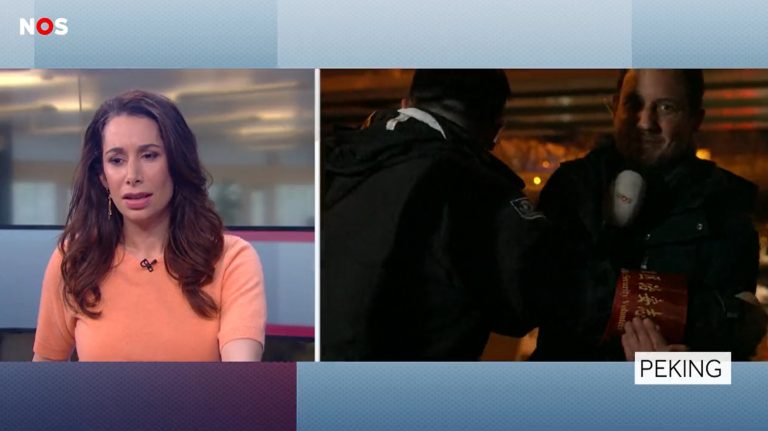A Dutch reporter was removed live on air during coverage of the Beijing Winter Olympics by a security guard in an incident that sets the tone for press freedom over the coming two weeks.
On Feb. 2, just days before the opening ceremony was set to occur, Sjoerd den Daas, correspondent for the greater-Asia region to Dutch national broadcaster NOS, wrote to Twitter:
“A minor Earthquake in Beijing, 2.9 on the Richter scale. Enough to shake the sky-scrapers here. A Little harbinger for the Olympics, maybe?” den Daas wrote in Dutch.
Only seconds after den Daas got on air on Feb. 4 for a live report of the opening ceremony just outside the National Stadium, things went embarrassingly wrong.
“And now, over to China, to our correspondent Sjoerd. Sjoerd, you are near the stadium. What is China going to show in the next few hours?” the NOS anchorwoman opened up, according to our translator.
Success
You are now signed up for our newsletter
Success
Check your email to complete sign up
But even before den Daas could utter a word, a security guard dressed in a black jacket wearing a red armband indicating that he belonged to a volunteer-security group entered the frame out of nowhere.
“This way, buddy!” the man said in a local Beijing dialect. “Wait a minute, I am in the middle of a news airing,” den Daas countered in a not too bad rendition of the same dialect either. Then continuing in Dutch:
“Yeah, well, we are getting pulled away, as you might have noticed. We have also been forced to leave another area, so I fear we’ll have to get —”
NOS responds
“Our correspondent (den Daas) was pulled away from the camera by security guards at 12:00 pm (6 a.m. E.T. on Friday) live in the NOS Journaal,” NOS said in a statement on Twitter.
“Unfortunately, this is increasingly becoming a daily reality for journalists in China. He is fine and was able to finish his story a few minutes later.”
NOS Editor in Chief Marcel Gelauf, said the video was “a painful illustration” of how the press are being treated in Beijing.
“Sjoerd has often told and shown that it is hard (to work) as a journalist in China. There is a far-reaching tendency to curtail freedoms, and this may be even more so because of Corona,” Gelauff told a reporter of Algemeen Dagblad, a Dutch media outlet.
“I haven’t spoken to Sjoerd yet, but from what I saw from the images, I didn’t get the idea that he was in the way,” Gelauff added.
Strict regulations
Reporters in Beijing have been increasingly forced to comply with the most stringent COVID security protocols, including using a mandatory surveillance and contact tracing app and daily testing.
Furthermore, athletes and consorts are entirely segregated from ordinary people, living literally in a bubble, confined to a closed-loop.
The loop-zone comprises the three Olympic villages in Beijing, nearby Yanqing, and Zhangjiakou, which are interconnected through an intricate web of train and bus lines completely sealed off from the outside world in a crampy attempt of the communist regime to host a COVID-zero Olympic Games.
A Reuters reporter described the atmosphere inside the hotel as dystopian, with bartenders dressed in hazmat suits and PPE shaking cocktails and trundling spraybots relentlessly impregnating the air with awkward-smelling disinfectants.


















